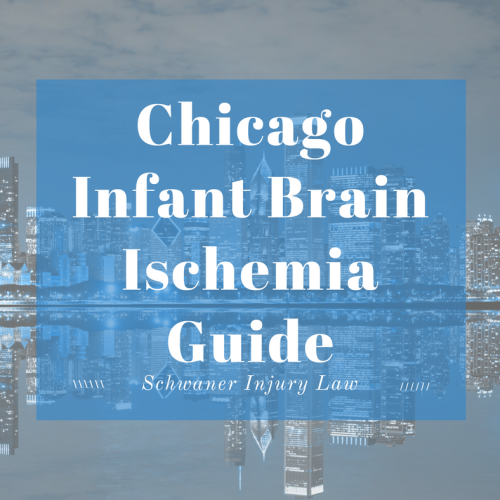
Chicago Infant Brain Ischemia – Birth Injury Guide
If your baby is diagnosed with infant brain ischemia, in layman’s terms, your baby has essentially had a stroke.
Brain ischemia occurs when blood flow is reduced to the vital organ, starving it of oxygen and other essential nutrients.
Without adequate blood and oxygen, brain cells die, potentially leading to brain damage, permanent disability, and death.
While ischemia is a medical term that encompasses any restriction in blood flow to tissue or organs, infant ischemia occurs when something disrupts the normal flow of blood to the baby’s brain, and it can occur during pregnancy, labor or delivery.
It most commonly occurs during labor and delivery, however, and is considered a medical emergency requiring quick action on the part of medical professionals to help reduce the level of potential damage that can occur.
What are the Symptoms of Infant Brain Ischemia?
Table of Contents
The symptoms of infant brain ischemia are so different than those of an adult who suffers a stroke that is it sometimes difficult to determine exactly what is happening.
Some signs and symptoms of infant brain ischemia include:
- Loss of consciousness.
- The inability to move certain parts of the body, including limbs.
- Overall and unusual lethargy, which can easily be confused with lethargy related to the effects of an epidural, making it a tricky symptom to diagnose.
- Seizures.
- Fetal distress.
Because infant brain ischemia is more likely to show itself through vital signs, it’s important to monitor the baby throughout the labor and delivery in order to detect symptoms quickly.
 If there are risk factors, an EEG can track electrical activity of the brain so that if a stroke occurs, physicians can act fast to lessen the damage. Too, if there are symptoms that suggest infant brain ischemia, it’s important that tests such as CT scans or MRIs are done in order to decidedly determine whether or not a stroke has occurred, so that action can be taken to help treat the loss of oxygen to the brain.
If there are risk factors, an EEG can track electrical activity of the brain so that if a stroke occurs, physicians can act fast to lessen the damage. Too, if there are symptoms that suggest infant brain ischemia, it’s important that tests such as CT scans or MRIs are done in order to decidedly determine whether or not a stroke has occurred, so that action can be taken to help treat the loss of oxygen to the brain.
The longer an infant brain ischemia goes untreated, the more serious the complications will be.
In general, there are two different types of infant brain ischemia:
- Focal Cerebral Ischemia. Blood vessels in the brain become obstructed, cutting off blood flow to critical areas of the brain, triggering an ischemic incident.
- Global Cerebral Ischemia. Blood to the brain ceases, cutting off oxygen and other nutrients to brain tissue. Global cerebral ischemic incidents are more likely to lead to lasting brain damage or death, especially so if medical professionals are slow to restore oxygen flow to the baby’s brain.
Causes of Infant Brain Ischemia
There are a wide range of things that can cause infant brain ischemia, including maternal biological factors and physician error.
The most common causes of ischemic strokes may include the following maternal issues:
- An infection such as meningitis or chickenpox during pregnancy.
- Preeclampsia, an infection that leads to dangerously high blood pressure for the mother. The condition can also restrict blood flow to the baby, causing infant brain ischemia.
- Genetic disorders, such as a family history of neurological issues.
- Dehydration, which slows blood flow, potentially depriving the baby of oxygen-rich blood.
- Lack of oxygen during birth, most often due to placenta abruption or a compressed umbilical cord.
- A heart defect present at birth.
- Blood disorders that cause injury to an artery, triggering a stroke.
- Birth defects caused by maternal drug abuse.
- Diabetes.
- High blood pressure during pregnancy that is not related to preeclampsia.
There are also several birth complications that can lead to brain ischemia, including:
- Shoulder dystocia, which can lead to longer time spent in the birth canal, hiking the risk of umbilical cord compression.
- Fetal macrosomia (a baby that is larger than average).
- Abnormally fast contractions or overstimulation, perhaps caused by drugs used to induce labor.
- A negative reaction to medications used during labor, including an epidural.
- Severe infections that transfer from mother to baby.
- Blood clots. These often form in the placenta and travel to the baby’s blood.
- Breech birth. This birthing position can cause umbilical cord compression, cutting off critical oxygen during the last stages of delivery.
- Trauma during delivery, including the misuse of birthing devices such as forceps or a vacuum extractor.
- Other forms of oxygen deprivation, such as the umbilical cord becoming wrapped around the baby’s neck or the disconnection of the placenta from the uterine wall.
- Cesarean sections with complications.
What Are the Complications Associated with Infant Brain Ischemia?
Like any person who has a stroke, the complications of infant brain ischemia can vary, and do so based on the level of oxygen deprivation the infant ha sustained.
Some potential problems include:
- Delayed or postponed achievement of infant developmental benchmarks.
- Noticeably impaired motor skill function.
- Recognizable cognitive impairment compared to peers.
- Cerebral palsy, which can impact both cognitive abilities and motor function.
Physical and occupational therapy, surgical interventions and orthotics to help strengthen muscles are all potential treatment options, depending on the degree of damage.
What Should You Do If Your Baby Suffers Brain Damage During Birth in Chicago?
Since brain ischemia is a brain injury to the infant, in many instances, such injuries can be prevented.
While conditions that the mother has can lead to infant brain ischemia, it is still the responsibility of the attending physician to monitor the baby throughout the pregnancy to ensure that infections and other issues don’t negatively impact the baby.
Oxygen deprivation and dehydration are both especially preventable causes for brain ischemia, as are maternal infections since a physician should treat the mother to ensure that the infection doesn’t spread to the infant.
If your baby suffered a brain ischemia injury at birth and you believe it could have been prevented, it is important to contact an attorney with experience in medical malpractice to help guide you through what will be a difficult, arduous and emotional process.
The right attorney can help put you at ease while gathering evidence to help you get the compensation you deserve to help care for your child, no matter the level of injury he or she sustained.
Attorneys familiar with the complexities of medical malpractice will be better able to secure the necessary compensation to help parents who may be faced with caring for their child for a lifetime.
“Personal Injury Attorney”
![]()
“Working with David was a pleasure. From the first time I spoke to him I felt at ease with him as he seemed more concerned with my well being before all. He was always keeping me updated on everything every step through the process and was always available for me if I had a question. David delivered more than expected for me in every way and I would recommend him to anyone. A real class act with your best interest at heart!”
Frank T.











